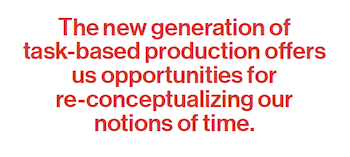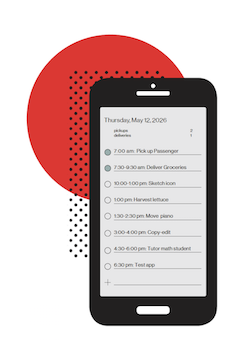Future Now
The IFTF Blog
Back to the Future?
From Time-Based to Task-Based Work
Not long ago in parts of Madagascar people measured time in units of “rice cooking,” i.e. how long it took to cook a pot of rice (about half an hour) or how long it took to “fry a locust” (a moment). Native people in Southern Nigeria used the saying a “man died in less than the time in which maize is not yet completely roasted,” (less than fifteen minutes). And according to anthropologist Remy Beaurieux, Kabyle peasants in Algeria possessed “an attitude of submission and of nonchalant indifference to the passage of time which no one dreams of mastering, using up, or saving…Haste is seen as a lack of decorum combined with diabolical ambition.” The clock was sometimes referred to as the “devil’s mill.” In such places there were no precise meal times, the notion of an exact appointment time was unknown, and people agreed to “meet at the next market.”
 This kind of un-timed, imprecise way of living may seem alien and quaint to us today but, in fact, throughout most of our history, before we invented clocks and highly efficient industrialized production, we did not view time as a measurable commodity to be sold for money, traded, or organized. Instead, our conception of time was tightly linked to tasks that needed to be done. If you lived in a fishing village, your day’s tasks were not assigned or planned with the help of clocks or calendars. Instead, in the words of historian E.P. Thompson, “the day’s tasks (which might vary from fishing to farming, building, mending of nets, thatching, making a cradle or a coffin) seem[ed] to disclose themselves, by the logic of need, before the crofter’s eyes.”
This kind of un-timed, imprecise way of living may seem alien and quaint to us today but, in fact, throughout most of our history, before we invented clocks and highly efficient industrialized production, we did not view time as a measurable commodity to be sold for money, traded, or organized. Instead, our conception of time was tightly linked to tasks that needed to be done. If you lived in a fishing village, your day’s tasks were not assigned or planned with the help of clocks or calendars. Instead, in the words of historian E.P. Thompson, “the day’s tasks (which might vary from fishing to farming, building, mending of nets, thatching, making a cradle or a coffin) seem[ed] to disclose themselves, by the logic of need, before the crofter’s eyes.”
This history is an opportune reminder for us today because a confluence of technological and economic factors is driving the re-emergence of task-based work, albeit in a very different form than the kind practiced in rural villages. Just think of Uber drivers, whose work is based not on predictable 8-5 schedules but around specific tasks—driving people between places. Many Uber drivers organize their days around available trips, paying particular attention to occurrences of “surge pricing”—when they can get more money for driving—which they can accept or decline. In some ways, surge pricing serves the same organizing function for Uber drivers as a good crop does for a homesteading family: an opportunity and a need to do something in order to sustain themselves and their families.
Institute for the Future’s ethnographic interviews with people working in the on-demand economy (i.e. via platforms that offer people different tasks they can complete on an ad-hoc basis rather than as full-time employees) reveal the emergence of task-based work in action. This is how people organize their days when they are signed up to do deliveries on platforms such as Doordash, edit reports on Upwork, walk dogs on Rover, or tag images on Mechanical Turk: In the language of many on-demand workers, tasks and work opportunities “ping” them and they choose whether to respond. Instead of talking about jobs, they talk about job “hits”—tasks that pop up on their computer dashboards or mobile screens as they go about their daily lives.
Reinventing Our Concept of Work
The tremendous growth of on-demand platforms is generating a lot of anxiety. One can easily glean it when reading articles in the popular press, participating in policy forum discussions, or attending numerous “future of work” conferences. Platforms are breaking down jobs into tasks that are accomplished by armies of people efficiently organized to produce and deliver with convenience and at speeds never seen before. These new ways of earning money are reinventing the meaning of work and challenging our conception of jobs as we’ve known them our entire lives, so the concern is understandable.
 Over the course of nearly 300 years, we have developed a set of technologies, practices, needs, ideologies, and institutions that value, support, and equate time-based work with progress, virtue, and necessity. We see time-based work as something that enables large-scale production, where we need to synchronize work and are highly co-dependent on other people’s activities. To produce efficiently at scale we had to organize our time in precise and pre-planned chunks of time. The ability to measure and sell time as a commodity is thus a necessary element of this kind of production system. And the diffusion of clocks enabled this, making the transition from task-based to timebased work possible. In his 1983 book, “Revolution in Time: Clocks and the Making of the Modern World,” Harvard economic historian David Landes argued that clocks and watches had a greater effect than steamships and power looms in driving the economic development of the West, leading to the Industrial Revolution and eventually to the advanced form of capitalism we have today. Such progress is embodied in Benjamin Franklin’s famous piece of advice to a young tradesman in 1748, “Remember that Time is Money.”
Over the course of nearly 300 years, we have developed a set of technologies, practices, needs, ideologies, and institutions that value, support, and equate time-based work with progress, virtue, and necessity. We see time-based work as something that enables large-scale production, where we need to synchronize work and are highly co-dependent on other people’s activities. To produce efficiently at scale we had to organize our time in precise and pre-planned chunks of time. The ability to measure and sell time as a commodity is thus a necessary element of this kind of production system. And the diffusion of clocks enabled this, making the transition from task-based to timebased work possible. In his 1983 book, “Revolution in Time: Clocks and the Making of the Modern World,” Harvard economic historian David Landes argued that clocks and watches had a greater effect than steamships and power looms in driving the economic development of the West, leading to the Industrial Revolution and eventually to the advanced form of capitalism we have today. Such progress is embodied in Benjamin Franklin’s famous piece of advice to a young tradesman in 1748, “Remember that Time is Money.”
However, diffusion of clocks is only one of a complex set of factors that led to our transition from task- to time-based work. Thompson argues that along with this emergence of precise time-measurement technology we also had to engage in social invention, pioneering division of labor, the emergence of a supervisory class, creation of fines and monetary incentives, universal schooling, and the suppression of fairs, festivals, sports and many other communal and non-work activities (often deemed sinful)—that have ultimately led to the creation of new labor habits and a new era of time discipline. All of this did not happen overnight, but unfolded across multiple generations.
Redefining Our Interactions With Machines
And just as technology of the clock ushered in new social norms, beliefs, and practices, the new set of technologies that is driving the rise of on-demand platforms is likely to do the same. In particular, our networking infrastructure, including the Internet and mobile devices, enables the atomization of work—the ability to divide big tasks into smaller pieces and distribute these widely across networks of people. They make it possible for tasks to “disclose themselves” to those who are willing and best fit to complete them. At the same time, computing and artificial intelligence tools allow us to deploy algorithms rather than human managers, i.e. the supervisory class, to allocate and coordinate production of the final product. The emergence of companies like Uber, Upwork, Doordash and many other on-demand platforms that rely on algorithms to directly match human consumers and producers is just the first stage in the transition to task-based work. It is likely that the next generation of platforms will take advantage of automated vehicles to take humans out of the production role, matching, for example, autonomous vehicles with people who need rides. From there, it’s easy to envision a system where economic value is often created entirely without humans. In this “capitalism of things,” smart objects and systems could exchange value and trade services autonomously.
Rethinking Our Relationship With Time
But this is just the beginning. Along with technological advances we will be evolving new ideologies and new notions of what is acceptable, appropriate, and sinful in this new system. In particular, we will need to re-think our attitudes towards leisure or non-work time. Just as diffusion of time-based production necessitated demonization of slothfulness, indolence, and human inefficiency (in a time-based world your worth is often based on how productive you are), the new generation of task-based production offers us opportunities for re-conceptualizing our notions of time. If this were to happen, we would need to create new concepts and ideologies that would make leisure acceptable and indeed desirable. This is how Thompson outlined this challenge in a paper in 1965.
 If we are to have enlarged leisure, in an automated future, the problem is not “how are men going to be able to consume all these additional time-units of leisure?” but “what will be the capacity for experience of the men who have this undirected time to live?” If we maintain a Puritan time-valuation, a commodity-valuation, then it is a question of how this time is put to use, or how it is exploited by the leisure industries. But if the purposive notation of time-use becomes less compulsive, then men might have to re-learn some of the arts of living lost in the industrial revolution: how to fill the interstices of their days with enriched, more leisurely, personal and social relations; how to break down once more the barriers between work and life.
If we are to have enlarged leisure, in an automated future, the problem is not “how are men going to be able to consume all these additional time-units of leisure?” but “what will be the capacity for experience of the men who have this undirected time to live?” If we maintain a Puritan time-valuation, a commodity-valuation, then it is a question of how this time is put to use, or how it is exploited by the leisure industries. But if the purposive notation of time-use becomes less compulsive, then men might have to re-learn some of the arts of living lost in the industrial revolution: how to fill the interstices of their days with enriched, more leisurely, personal and social relations; how to break down once more the barriers between work and life.
Of course, the future never repeats the past, or to paraphrase Mark Twain, “history doesn’t repeat itself but it does rhyme.” However we evolve the next generation of task-based work, it is likely to be very different from the task-based living of our ancestors. But the key questions we will need to grapple with, and where some of the ideological battles are likely to be fought, are precisely the ones Thompson identified in 1965: Will automated production lead to increasing commodification of our time—a kind of extreme automation combined with extreme time commodification—or will it enable us to decommodify our notions of time and re-capture that which is unproductive, unplanned, unpredictable, and yet uniquely human? If the latter (and this is the future I am rooting for), there is a lot we will need to re-learn from our past.
 FUTURE NOW—When Everything is Media
FUTURE NOW—When Everything is Media
In this second volume of Future Now, IFTF's print magazine, we explore the future of communications. In our research process, we traced historical technology shifts through the present and focused on the question, “what is beyond social media?”
Think of Future Now as a book of provocations; it reflects the curiosity and diversity of futures thinking across IFTF and our network of collaborators. It contains expert interviews, profiles and analyses of what today’s technologies tell us about the next decade, as well as comics and science fiction stories that help us imagine what 2026 (and beyond) might look and feel like.
For More Information
For more information on IFTF's Future 50 Partnership and Tech Futures Lab, contact:
Sean Ness | sness@iftf.org | 650.233.9517



